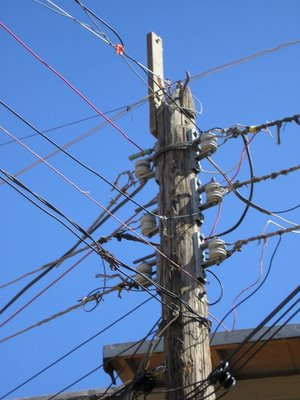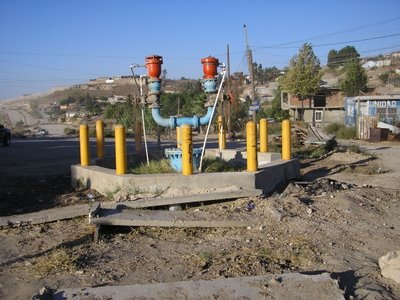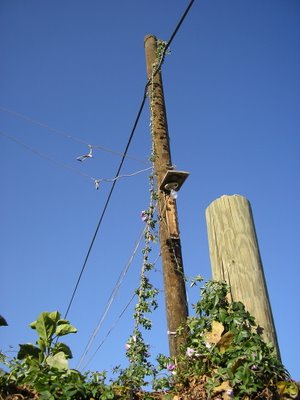People's Power

This is what the power poles in Ejido Maclovio Rojas look like. They are very festive, with all different colors of wire coming off of them and heading off to this house, that street. Some of it is pretty heavy cable for carrying a good amperage over distance, but a lot of it is the cheapest gauge of lamp cord that you could hope to buy in the ferreteria, or hardware store. (Ferre refers to ferrous, or iron, I assume.) You see, the people of Maclovio have appropriated their power from the grid, and their water from the aqueduct. The land they acquired by homesteading it, in a legally sanctioned kind of land reform deal that isn’t that unusual in Latin America.
Here’s where they tapped into the aqueduct:

They did screw up one thing, however. They tried to choose land that was unoccupied and uncontested, BUT, they didn’t count on NAFTA (the North American Free Trade Agreement), and the incredible proliferation of maquiladoras (factories) in this region. Toyota, Hyundai, Toshiba, and other international corporations are encroaching on Ejido Maclovio Rojas. It has gone from an abandoned cerrito to some fairly hotly contested real estate last appraised at $98 million U.S. dollars! It may be that what saves Maclovio Rojas is that globalization closes the maquiladoras and sends manufacturing overseas to China, where labor is cheaper and there are even fewer environmental regulations. Of course, if that happened, the local economy would collapse as well…
Theft of water was the charge that put community leader Nikolasa into jail for four long years. The claim that the founders of Ejido Maclovio Rojas were profiting by selling water to the people was the justification for her arrest. Because Mexico has Napoleonic law, where the accused is essentially guilty until proven innocent, this was adequate to lock Nikolasa, a woman in her sixties who has uterine cancer and other health issues, up for four years. When she spoke to our students, many were deeply moved. She has never spoken to a student group of ours before because she has been in jail since before the Woolman Semester started coming here, though students from the old John Woolman four-year high school sometimes spent Spring Break here. She told us that she was sustained in jail by her belief in Jesu Cristo, and her knowledge that since her arrest had alerted the rest of the community leaders, who then went into hiding and were not arrested though there were warrants out for them, that she was not in jail alone, but that the whole community was continually with her.
The seed of the community’s spirit, which squatted on the land, living in tents and eating rattlesnake meat in the founding days, is still present in Ejido Maclovio Rojas. You can still hear about how, when the Federales came to boot them out, all the young lovelies came to distract the soldiers, asking for special dispensations, etc., while the people of the communidad pretended to move their furniture and belongings out of their houses, but were actually creating a blockade of Mexican Highway 2, which runs along the foot of Maclovio. When the traffic back up began to effect things in the United States, the Federales were called off, and the people moved back into their houses to fight again another day.
There are also other forces at work, however. There are many folks in Maclovio who don’t hold these old revolutionary ideals. They have middle class aspirations, and want to work in the maquiladoras and be able to sell their houses and move “up.” Because you cannot sell your holding in an ejido, this creates tension. Communidad, and not real estate speculation is the value that the community is built around. Will these old values hold?
There are factions now, and I can’t follow it all, but it seems to me that it bodes ill for the ejido. Larger forces are always at work—can the government really afford to let this upstart social experiment exist for twenty years? They are at eighteen already. Who is really behind the opposition group—The Choke (pronounced CHO-kay)? Are they funded with corporate dollars?
Meanwhile, the perros [dogs] wander the calles [streets], the Chicago nuns tut-tut at the anarchical architecture of the school across the way from them. When you try to run a Skilsaw up at the health clinic, the amperage may not be what you would expect, but the saw will cut eventually. The purified water at la tienda will never make you sick, the arcade is open, and the citizens of Ejido Maclovio Rojas are as sweet and dignified as any people anywhere. There is an open air market, a huge soccer campo, an Internet café, and a dance hall. Even an artifact as dull and utilitarian as a power pole has style and soul in Maclovio Rojas. I like it here. It’s just a little bit like paradise.



1 Comments:
I managed to make my way to this spot for a day with two small children in tow during this visit. I reflected a lot on the colors and the smell of the place as it seemed to unsettle my 8 year old. I think it unsettled him mostly because he feels so deeply the descrepancy between his life and those of the children playing nearby in the dirt of Maclovio. It was entirely unfamiliar and yet only 80 miles from our home. I accepted the descrepancies as just a part of life and my mind moved immediately towards actions to take. My son, instead, just allowed himself to feel it all without psychological buffers. I am sure it is a trip he'll never forget.
Post a Comment
<< Home